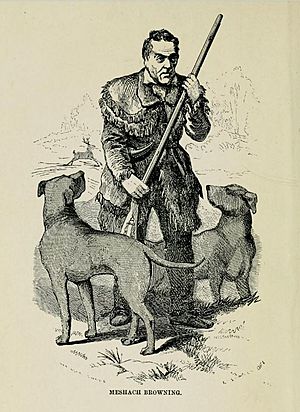Meshach Browning facts for kids
Quick facts for kids
Meshach Browning
|
|
|---|---|

A drawing of Meshach Browning from his 1859 book, Forty-Four Years of the Life of a Hunter.
|
|
| Born | 1781 Damascus, Maryland, U.S.
|
| Died | November 19, 1859 (aged 77–78) Johnstown, Cambria County, Pennsylvania, Pennsylvania, U.S.
|
| Resting place | St. Dominic's Catholic Cemetery, Hoyes, Maryland |
| Other names |
|
| Occupation |
|
| Employer | Maryland state government, self-employed |
| Spouse(s) |
|
| Military career | |
| Allegiance | |
| Service/ |
|
| Years of service | 1812–1814? |
| Rank | sergeant |
| Unit | Allegany County Militia |
| Battles/wars | War of 1812 |
Meshach Browning (born 1781 – died November 19, 1859) was an early backwoodsman, hunter, and explorer. He explored the areas around the North Branch Potomac and Youghiogheny Rivers. He wrote a book about his life called Forty-Four Years of the Life of a Hunter (1859). Many people remember him as Maryland's most famous frontier hunter.
Browning's book describes his "hunting-fever" years from 1795 to 1839. He wrote it using a turkey feather pen. The book is part history of the backwoods and part adventure story. It tells about his hunting trips and dangerous moments while tracking animals. It also shares details about life in early frontier America and how people lived in western Maryland long ago.
Contents
Early Life and Family
Meshach Browning was born in Damascus, Montgomery County, Maryland. His father was an English soldier who escaped from a difficult battle in 1755. He then settled in the mountains of Western Maryland.
The people in this community lived off the land. Men wore deer skins that they hunted and made into clothes themselves. Women spun and wove flax and wool. The only things they needed from outside were gunpowder and lead for their guns.
Meshach Browning married Mary McMullen (1781–1839) on April 13, 1799. They married in Blooming Rose, Maryland. After Mary died, he married Mary M. Smith on April 24, 1841, in Allegany County, Maryland.
Military Service in the War of 1812
Meshach Browning served as a sergeant in the local army, called the militia, during the War of 1812. His group only saw action once. This was when some soldiers were unhappy with their commander and tried to fight him. It seems the commander won that fight.
Hunting Adventures
Meshach Browning became very skilled at woodcraft, which means knowing about forests and wild animals. He understood how animals behaved and where they lived. He hunted many animals like white-tailed deer, black bears, panthers, and wolves.
He hunted in the "western wilderness," which was the Allegheny Mountains. This area included Garrett County, Maryland and parts of what is now West Virginia. Browning was known as a market hunter. This means he hunted animals to sell their meat and furs to others. His hunting skills became very famous.
Later Years and Community Work
Meshach Browning and his son-in-law, Dominick Mattingly, helped collect money to build a church. This church was in Johnstown, Pennsylvania. Their hard work led to St. James Church, which opened in 1853. It was a successful church for many years.
Death
Meshach Browning died on November 19, 1859, in Johnstown, Cambria County, Pennsylvania.
Legacy and Impact
Meshach Browning's book was published in 1859. A reviewer noted that his family, started in 1800, grew to 122 people fifty years later. Browning was proud that 67 of them could "bear arms for the defence of their country."
His story about a tough fight with a large deer in the Youghiogheny River inspired an artist. Arthur Fitzwilliam Tait (1819-1905), a famous artist and deer hunter, painted the scene in 1861. The painting was called The Life of a Hunter: Catching a Tartar. Later that year, a company called Currier and Ives made copies of Tait's painting. This helped make the story famous forever.
A historical marker in Maryland says that Browning was Garrett County's most famous hunter. It states he killed 2,000 deer and 500 bears over 40 years. This marker is near Browning's grave at St. Dominic's Catholic Cemetery in Hoye, Maryland.
In 1890, St. James Church was rebuilt and its name was changed to St. Dominic Church. This new name honored Dominick Mattingly, who was a very religious Catholic. His wife, Ann Browning, was Meshach's daughter. The church was located across the road from the Mattingly family home in what is now Hoye, Maryland. The cemetery next to the church holds the graves of Meshach Browning, D. J. Mattingly, and many of their family members.
Works
- Forty-Four Years of the Life of a Hunter; Being Reminiscences of Meshach Browning, a Maryland Hunter; Roughly Written Down by Himself, Revised and illustrated by E. Stabler. Philadelphia: J. B. Lippincott & Co., 1859. (Many later versions of the book include twelve hunting scene drawings by Edward Stabler [1794-1883].)
 | Jackie Robinson |
 | Jack Johnson |
 | Althea Gibson |
 | Arthur Ashe |
 | Muhammad Ali |

